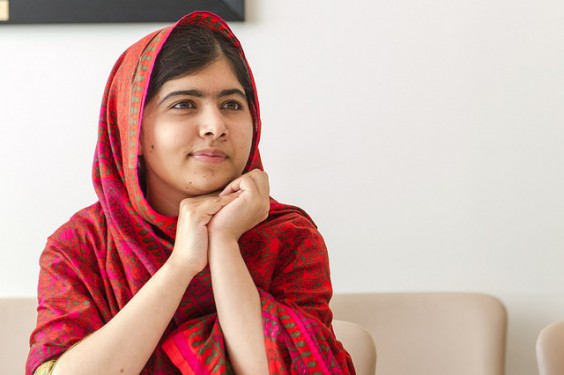All Girls Must Go to School
by Bina Shah / November 13, 2014 / No comments
A libretto in honor of Malala Yousafzai.

Malala Yousafzai. Photo via Flickr user: United Nations Photo.
Last year, I had the extraordinary good luck to be commissioned by London’s Crouch End Festival Chorus to write a libretto about the life of Malala Yousafzai, recipient of the Nobel Peace Prize. British composer James McCarthy wrote the score, which was performed by the award-winning Crouch End Choir on October 28. An orchestra accompanied the choir, conducted by David Temple.

- Pakistan is a country of contradictions – full of promise for growth, modernity and progress, yet shrouded by political, social and cultural issues that undermine its quest for identity and integrity. My bi-monthly column “Pakistan Unveiled” presents stories that showcase the Pakistani struggle for freedom of expression, an end to censorship, and a more open and balanced society.

- Bina Shah is a Karachi-based journalist and fiction writer and has taught writing at the university level. She is the author of four novels and two collections of short stories. She is a columnist for two major English-language newspapers in Pakistan, The Dawn and The Express Tribune, and she has contributed to international newspapers including The Independent, The Guardian, and The International Herald Tribune. She is an alumnus of the International Writers Workshop (IWP 2011).
I may be a writer, but I’m a terrible poet. Still, when James contacted me to ask if I’d be interested in writing the verses to accompany the score, I had to say yes. It thrilled me to immortalize Malala in song, and to take on a project that had never been done before. I felt I could be more passionate than when I wrote a newspaper column about her. I also had space to touch on the emotional aspects of her story. It was a freedom that I relished, and I could allow my creativity to play in constructing the libretto.
I divided the libretto into five parts, with a prologue about a girl in Swat – not Malala – whose mother loves to hear the far cry of doves. When war comes to the valley, terrible things happen. Then I wrote about the beauty of the Swat Valley, which people liken to Switzerland for its gorgeousness:
Once there was a land of ice-capped mountains
And moonlit glaciers
Blue skies and silver lakes, green meadows
Forest of fruit trees,
Mulberry, pear, apricot
Walnut, fig, apples
Carpets of flowers
Jasmine and roses
This is Swat, the valley of flowers
In the blessed land of Pakistan
Only after I set the scene did I introduce Malala, explaining the origin of her name (she was named after Malalai of Maiwind, a heroine of Afghanistan) and her daily life: going to school and playing with her friends. Once the Taliban came to Swat and closed the schools, Malala wrote a diary under the name “Gul Makkai” (Cornflower), which was famously published by BBC Urdu and translated into English too. In this section, Malala vows she’ll continue her education, no matter the danger.
We’ve decided, my mother and father and I
I’m going to go to school today
I’ll hide the books under my shawl
That way they won’t know what I’m doing
And when I come home, after homework is done
I’ll write in my diary, it will go online
To the BBC. The whole world
Will know what it means to be a girl
In a time and a place when being a girl is a crime
And a disgrace. But they are wrong…
Writing about Malala’s shooting was very difficult. I had evoked a beautiful, serene place, ruined by war. I had channeled a spirited, brave girl who decided to resist by continuing with her education. Now I had to write about that terrible day when a masked gunman nearly took her life. I had to steel myself to write the words, but instead of focusing on the horror of the attack, I decided to emphasize Malala’s courage and will to live with a moving chorus. A choir of schoolgirls sang it during the libretto’s premiere:
My name is Malala Yousafzai!
Watch me as I reach for the sky!
I want to live, I will not die!
I am Malala Yousafzai!
The last section of the libretto was a stirring anthem about the message that Malala continues to speak about today: all girls must go to school. I wanted to write about the universality of all girls and how important it was for them to be educated. I also wanted to show how positively the world had responded to their desire for education.
Malala, Shazia, Kainat and Shahbano
Daughters of Swat! Of Pakistan! Of Afghanistan
Of India and China, of Africa and America!
All girls must go to school
It’s your right to laugh, to play and to learn
We see you as you yearn
To open the doors of freedom
And we will not disappoint you
We bear witness to your struggle,
We share in your tragedy
We reach out to you in solidarity
And we envelop you in love.
When James sent me the music he’d composed, I couldn’t believe what he’d done with this last section. He turned it into a swelling chorus, echoing the words, lifting them up, and turning them into something truly magical. He particularly liked the sentence “We envelop you in love,” and picked out the word “love” to be repeated again and again in rounds by all the different voices.
The effect was so powerful that I cried as I listened to the music and followed the words in the score James sent me. Although I know the strength of words on the page, it was the first time I understood the power of words when they are sung. When illuminated by human voices, language takes on a brilliance and majesty that writers of books and columns don’t always understand; our words are read silently, by individuals far away from us.
To hear one’s words performed is an honor and privilege. I now understand why playwrights and songwriters love what they do. I’m grateful that my first attempt had such amazing partners and such a worthy subject.
For more information visit: https://soundcloud.com/laura-kramer-3/malala-cefc-commission-world-premiere.




